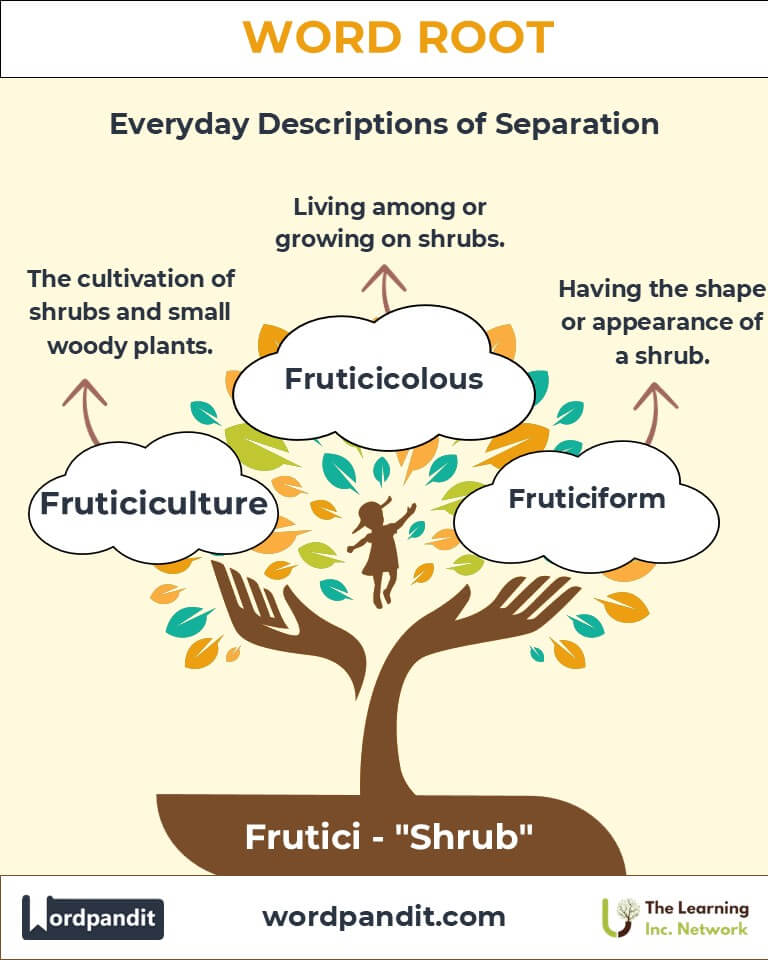Frutici: Rooted in the Language of Shrubs and Growth
Dive into the intriguing world of the word root frutici, derived from Latin, meaning "shrub." From its botanical beginnings to its metaphorical uses, this root branches into words like "fruticose" and "frutescent," revealing how shrubs have shaped both language and understanding across diverse disciplines.

Table of Contents
- Introduction: The Shrub’s Linguistic Legacy
- Etymology and Historical Journey
- Mnemonic: Unlocking the Power of Frutici
- Common Frutici-Related Terms
- Frutici Through Time
- Frutici in Specialized Fields
- Illustrative Story: Frutici in Action
- Cultural Significance of the Frutici Root
- The Frutici Family Tree
- FAQs about the Frutici Word Root
- Test Your Knowledge: Frutici Mastery Quiz
- Conclusion: The Ever-Growing Influence of Frutici
Introduction: The Shrub’s Linguistic Legacy
Imagine the humble shrub—sturdy, adaptable, and an integral part of ecosystems. The Latin root frutici, meaning "shrub," provides a foundation for a range of words describing shrub-like forms or growth patterns. Pronounced as "froo-ti-see," this root invites us to explore how shrubs inspire language, biology, and culture. Whether describing botanical features or figurative growth, frutici underscores the connection between nature and expression.

Etymology and Historical Journey
The root frutici stems from the Latin word frutex, meaning "shrub" or "bush." In classical literature, frutex was often used to describe dense vegetation or undergrowth. Over time, this root influenced terms in botany and evolved metaphorically to describe structures or systems resembling shrubs. From Latin to modern English, frutici remains a vivid descriptor for natural growth and its many forms.
Mnemonic: Unlocking the Power of Frutici
Picture a lush, green shrub spreading its branches outward. Each branch symbolizes a word derived from frutici, extending the root’s meaning into various domains.
"Frutici is the root of shrubs, branching into words of growth and form."
Common Frutici-Related Terms
- Fruticose (froo-ti-kohs)
- Definition: Having a shrub-like or bushy appearance.
- Example: "The fruticose lichens covered the rocky hillside, resembling miniature shrubs."
- Frutescent (froo-tes-uhnt)
- Definition: Becoming or resembling a shrub.
- Example: "The young tree exhibited frutescent characteristics as its branches thickened."
- Fruticulose (froo-tik-yoo-lohs)
- Definition: Slightly shrubby or having small, bushy forms.
- Example: "The garden's fruticulose plants added texture to the landscape."
- Fruticetum (froo-ti-see-tum)
- Definition: A collection or garden of shrubs.
- Example: "The botanical garden’s fruticetum showcased diverse shrub species."
- Frutex (froo-teks)
- Definition: The Latin term for a shrub.
- Example: "Ancient texts often reference frutex when describing Mediterranean flora."
Frutici Through Time
- Frutex in Roman Writings: Early Roman writers used frutex to describe dense vegetation, particularly in poetry and natural history texts.
- Fruticose in Botany: The term gained prominence in the 18th century as botanists classified lichen forms.
- Frutescent in Modern Language: Over time, frutescent expanded to describe not only plants but also other systems or structures mimicking shrub-like growth.
Frutici in Specialized Fields
- Botany:
- Fruticose Lichens: Essential indicators of air quality and environmental health.
- Horticulture:
- Fruticetum: Shrub gardens remain a vital part of botanical studies and landscape design.
- Metaphorical Usage:
- Fruticesque Systems: Used in literature and philosophy to describe complex, branching systems resembling shrubs.
Illustrative Story: Frutici in Action
In a quaint village, a horticulturist named Clara set out to create a unique fruticetum featuring rare shrubs. As the garden grew, it became a haven for wildlife and a centerpiece for the community. Locals marveled at the fruticose lichens adorning the stones and the frutescent saplings that hinted at the garden's potential. Clara’s project highlighted the beauty of shrubs and their ability to bring people closer to nature.
Cultural Significance of the Frutici Root
Shrubs hold symbolic meaning in many cultures. In ancient Rome, shrubs often represented resilience and fertility. Modern landscaping traditions continue to value shrubs for their aesthetic and functional roles, making frutici a lasting symbol of growth and harmony with nature.

The Frutici Family Tree
Explore related roots and their connections to "Frutici":
- Arbor (Latin: "tree"):
- Arboretum: A collection of trees.
- Virid (Latin: "green"):
- Viridescent: Becoming green.
- Herb (Latin: "plant"):
- Herbaceous: Relating to herbs or non-woody plants.
FAQs About the Frutici Word Root
Q: What does "frutici" mean?
A: "Frutici" comes from the Latin root frutex, meaning "shrub" or "bush." It represents shrub-like growth in both literal and metaphorical contexts, often describing plants, lichens, or branching structures.
Q: What are fruticose lichens?
A: Fruticose lichens are shrub-like lichens that grow upright or have a bushy appearance. These lichens are an essential part of ecosystems, often acting as air-quality indicators because of their sensitivity to pollutants.
Q: How is the term "frutescent" used metaphorically?
A: While "frutescent" literally describes something becoming shrub-like, metaphorically, it can refer to systems, structures, or even abstract ideas that branch out like shrubs. For example, a frutescent argument might be one that develops multiple branches or complexities.
Q: What is a fruticetum?
A: A fruticetum is a specialized garden or collection of shrubs, often created for scientific, decorative, or conservation purposes. It serves as a controlled environment for studying and showcasing the diversity of shrub species.
Q: Why is the root "frutici" significant in botany?
A: "Frutici" is used to classify plants, lichens, and other organisms with shrub-like characteristics. Its importance lies in helping botanists describe and group these forms, aiding in research and ecological studies.
Q: Can frutici-derived words apply beyond botany?
A: Yes, words like "frutescent" are sometimes used metaphorically in fields like literature or architecture to describe forms or ideas that grow outward in a shrub-like manner, emphasizing complexity or branching.
Q: What is the difference between fruticose and fruticulose?
A: While both describe shrub-like characteristics, fruticose refers to plants or lichens with a distinctly bushy or upright appearance, whereas fruticulose applies to smaller, less pronounced shrub-like growths.
Q: How has "frutici" influenced modern language?
A: The root "frutici" has enriched modern English, especially in scientific and metaphorical contexts. Its presence in terms like "fruticose" and "frutescent" demonstrates its adaptability in describing both physical and conceptual growth.
Test Your Knowledge: Frutici Mastery Quiz
1. What does "frutici" mean?
2. Which term describes a collection of shrubs?
3. What does "fruticose" describe?
4. Which root word means "tree" in Latin?
5. What does "frutescent" mean?
Conclusion: The Ever-Growing Influence of Frutici
The root frutici exemplifies how language mirrors nature. From its origins in Latin to its use in botany and metaphor, this root reminds us of the enduring connection between shrubs and growth. As language and science evolve, frutici will continue to sprout new meanings, enriching our understanding of the natural world.












